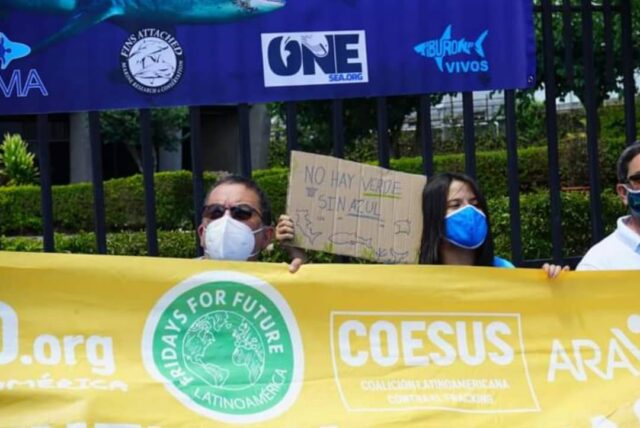Just as many people have appreciated, Costa Rica has an incredible biodiversity and let’s say that it is its main weakness, but who are in charge of protecting it and who has been in charge of causing it harm? A question that perhaps many ecologists and citizens will know the answer, but here TCRN will answer them with arguments.
A campaign not being taken into account?
Randall Arauz, defender of sharks, has made it clear that “while the State thinks that sharks are commercial species that deserve to be fished to extinction, he and numerous organizations, in addition to 54,000 thousand people from around the world, have fought for their protection.”
In recent days, the organizations for the protection of the seas and Randall, carried out a sit-in in front of the Presidential house to demand that the President of Costa Rica, Carlos Alvarado, convene the project 21,754 and thus, the endangered species of sharks are considered protected wild life again.
The thousands of people around the world and members of the organizations assure that the hammerhead shark in the country has been declared a species of wildlife “that must be protected by the Wildlife Conservation Law and by the Minae (Ministry of Environment).”
Overfishing, fatal damage

According to experts, overfishing is the greatest threat to sharks and other species. In the opinion of defense ecologists, “according to the Presidency and the Minae with everything and the vice-ministry of the Sea, the problem will be fixed in Costa Rica by continually following fishing, as well as the capture and commercialization of endangered species.”
The initiative to protect marine species, such as sharks, dates back to May 2007, when the Costa Rican state enacted that sharks – were not wildlife – and were considered to be managed by Incopesca (the State’s Fishing coordinator), which is an institution, according to Arauz, “highly recognized with an inherent conflict of interest in its board of directors; the decisions that are made are always for the benefit of private companies and not to defend the public interest.”
Current lawsuit for allowing hammerhead shark fishing
The Costa Rican State, the Costa Rican Fisheries and Aquaculture Institute (Icopesca) and the National System of Conservation Areas (Sinac) are facing a lawsuit today for allowing hammerhead shark fishing. The trial is in the Contentious Administrative Court of the country.
It is worth noting that since 2016, the lawyer and specialist in environmental issues Walter Brenes, with the collaboration of Randall Arauz, sued the institutions and the State for a declaration of fishing interest that weighs on the hammerhead shark in the country.
In this regard, Brenes explained that a ban on hammerhead shark fishing is being sought, since it is in high danger of extinction, “it is estimated that more than 90% of the population in recent years, in less than two decades can be extinguish”.
10 hours of confrontations in the courtroom
Therefore, Arauz as the main defender of sharks in Costa Rica, emphasized the 10 hours he was in a courtroom, facing the attorneys of the Attorney General’s Office and other institutions such as Sinac and Icopesca, “stay tuned, we have to wait three weeks for a resolution”, he advises.
On the same day of the sit-in, an environmentalist on her social networks said that President Carlos Alvarado was at two international events talking about Costa Rica’s leadership role in environmental and climate action matters, while outside they were asking him to please convene project 21,754 for sharks to be recognized and protected as Wildlife.
Do you remember the resolution of Minagricultura that allowed the fishing and sale of sharks and their fins?
Some time ago, the Costa Rican Ministry of Agriculture issued a regulation, allowing the hunting of 350 tons of sharks in the Pacific Ocean and 125 tons in the Caribbean Sea. Through Resolution number 00350 of October 25, 2019, the Ministry established the global fishing quotas for the different species under use for what was the year 2020. As an explanation of environmentalists, the Government agreed in 2019, on the commercialization of sharks and their fins. This is what Tico environmentalists are fighting against.
